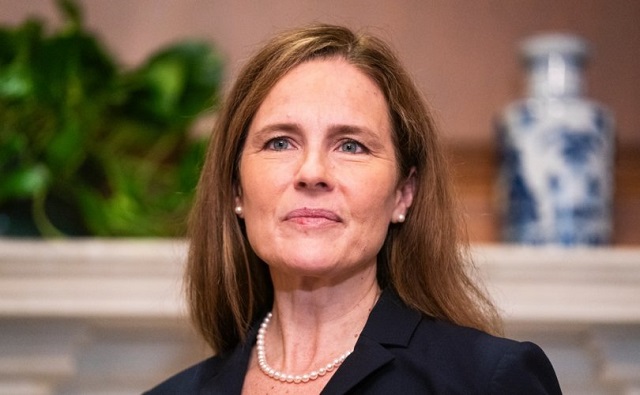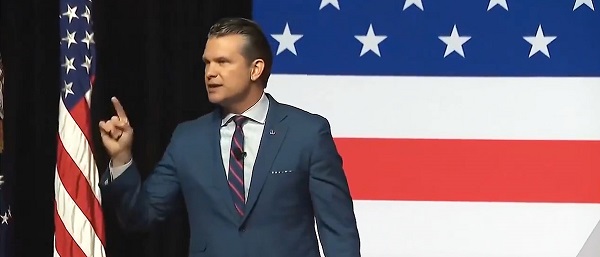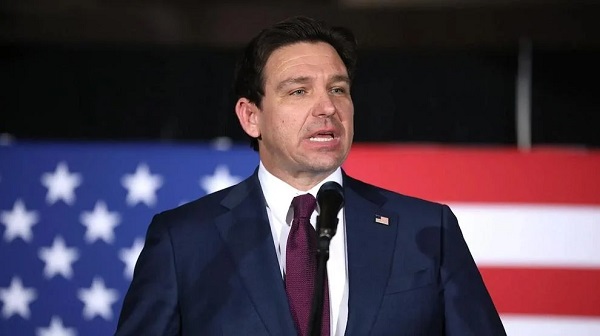International
Supreme Court unanimously rules that public officials can be sued for blocking critics on social media

From LifeSiteNews
Supreme Court Justice Amy Coney Barrett Justice noted that the personal social media accounts of public officials often present an ‘ambiguous’ status because they mix official announcements with personal content.
The United States Supreme Court ruled unanimously on Friday that government officials who post about work-related topics on their personal social media accounts can be held liable for violating the First Amendment rights of constituents by blocking their access or deleting their critical comments.
In a 15-page opinion, Justice Amy Coney Barrett noted that the personal social media accounts of public officials often present an “ambiguous” status because they mix official announcements with personal content.
The court ruled in two cases where people were blocked after leaving critical comments on social media accounts of public officials.
The first case involved two elected members of a California school board — the Poway Unified School District Board of Trustees — who blocked concerned parents from their Facebook and Twitter accounts after leaving critical comments.
The court upheld the 9th U.S. Circuit Court of Appeals ruling that said the board members had violated the parents’ free speech rights.
The second case before the court concerned James Freed, Port Huron, Michigan’s city manager who had blocked constituent Kevin Lindke from commenting on his Facebook page after deleting his remarks about the city’s COVID-19 pandemic policies.
Lindke believed that Freed had violated the First Amendment by doing so and sued Freed.
Freed maintained that he launched his Facebook page long before becoming a public official, arguing that most of the content on his account concerned family-related matters.
Justice Barrett explained:
Like millions of Americans, James Freed maintained a Facebook account on which he posted about a wide range of topics, including his family and his job. Like most of those Americans, Freed occasionally received unwelcome comments on his posts. In response, Freed took a step familiar to Facebook users: He deleted the comments and blocked those who made them.
For most people with a Facebook account, that would have been the end of it. But Kevin Lindke, one of the unwelcome commenters, sued Freed for violating his right to free speech. Because the First Amendment binds only the government, this claim is a nonstarter if Freed posted as a private citizen. Freed, however, is not only a private citizen but also the city manager of Port Huron, Michigan — and while Freed insists that his Facebook account was strictly personal, Lindke argues that Freed acted in his official capacity when he silenced Lindke’s speech.
Barrett concluded:
When a government official posts about job-related topics on social media, it can be difficult to tell whether the speech is official or private. We hold that such speech is attributable to the State only if the official (1) possessed actual authority to speak on the State’s behalf, and (2) purported to exercise that authority when he spoke on social media.
In the end, the high court sent Lindke’s case back to the Sixth Circuit Federal Appeals Court for a second look.
Perhaps reflecting continued ambiguity following the court’s ruling, both defendant Freed and plaintiff Lindke declared victory.
“I am very pleased with the outcome the justices came to,” Freed told ABC News in a statement. “The Court rejected the plaintiff’s appearance test and further refined a test for review by the Sixth Circuit. We are extremely confident we will prevail there once more.”
Lindke was more effusive and told ABC News that he was “ecstatic” with the court’s decision.
“A 9-0 decision is very decisive and is a clear indicator that public officials cannot hide behind personal social media accounts when discussing official business,” said Lindke.
Legal experts called attention to the persistence of gray area in the law regarding social media due to the narrowness of the court’s decision.
“This case doesn’t tell us much new about how to understand the liability of the 20 million people who work in local, state, administrative or federal government in the U.S. … just that the question is complicated,” Kate Klonick, an expert on online-platform regulation who teaches at St. John’s Law School, told The Washington Post.
Katie Fallow, senior counsel for the Knight First Amendment Institute at Columbia University, told the Post that the court’s ruling does not sufficiently address public officials’ widespread use of personal “shadow accounts,” which constituents often perceive as official.
Fallow said the court was “right to hold that public officials can’t immunize themselves from First Amendment liability merely by using their personal accounts to conduct official business.”
We are disappointed, though, that the Court did not adopt the more practical test used by the majority of the courts of appeals, which appropriately balanced the free speech interests of public officials with those of the people who want to speak to them on their social media accounts.
According to The Hill, the Biden administration and a bipartisan group of 17 states and National Republican Senatorial Committee sided with officials, arguing in favor of their blocks, while the ACLU backed the cons
Friday’s ruling is only the first of several this term that deal with the relationship between government and social media.
“On Feb. 26, the justices heard argument[s] in a pair of challenges to controversial laws in Florida and Texas that seek to regulate large social-media companies,” explained Amy Howe on Scotusblog.com. “And on Monday the justices will hear oral arguments in a dispute alleging that the federal government violated the First Amendment by pressuring social media companies to remove false or misleading content. Decisions in those cases are expected by summer.”
Daily Caller
Hegseth Planning Huge Shakeup Of Top Military Command: REPORT


From the Daily Caller News Foundation
War Secretary Pete Hegseth is moving forward with a massive shakeup of military leadership, restructuring top commands and moving the U.S. focus away from Europe and the Middle East, according to a report out Monday.
Five sources with knowledge of the matter told The Washington Post the Pentagon is set to consolidate U.S. Central Command in the Middle East, U.S. European Command and U.S. Africa Command into a new larger combatant command, the U.S. International Command. Other commands would be similarly consolidated, reducing the total number of combatant commands from 11 to eight. The intended restructuring is designed both to reduce the number of admirals and four star generals and refocus the U.S. military on the Indo-Pacific and Western Hemisphere, according to the sources.
The plan would be one of the most significant changes to the military’s upper echelons in decades, and the move would bring the Pentagon more directly in line with the administration’s refocusing of priorities in the recently released National Security Strategy.
Dear Readers:
As a nonprofit, we are dependent on the generosity of our readers.
Please consider making a small donation of any amount here.
Thank you!
“As a matter of Department of War policy, we will not comment on leaked documents that we cannot authenticate and rumored internal discussions, as well as specifics of architectural discussion or pre-decisional matters,” a War Department official told the Daily Caller News Foundation. “Beyond this, any insinuation there is a divide within the Department is completely false – everyone in the Department is working to achieve the same goal under this administration.”
The Post also reports the proposal was crafted under supervision by Chairman of the Joint Chiefs of Staff Gen. Dan Caine, at Hegseth’s request. Caine will also be sharing two alternate proposals on potential restructures.
Hegseth has been looking for ways to reduce the number of four star generals in the Armed Forces, which has roughly the same amount of generals now as during World War II.
Daily Caller
Paris Climate Deal Now Decade-Old Disaster


From the Daily Caller News Foundation
By Steve Milloy
The Paris Climate Accord was adopted 10 years ago this week. It’s been a decade of disaster that President Donald Trump is rightly trying again to end.
The stated purpose of the agreement was for countries to voluntarily cut emissions to avoid the average global temperature exceeding the (guessed at) pre-industrial temperature by 3.6°F (2°C) and preferably 2.7°F (1.5°C).
Since December 2015, the world spent an estimated $10 trillion trying to achieve the Paris goals. What has been accomplished? Instead of reducing global emissions, they have increased about 12 percent. While the increase in emissions is actually a good thing for the environment and humanity, spending $10 trillion in a failed effort to cut emissions just underscores the agreement’s waste, fraud and abuse.
As a nonprofit, we are dependent on the generosity of our readers.
Please consider making a small donation of any amount here.
Thank you!
But wasting $10 trillion is only the tip of the iceberg.
The effort to cut emissions was largely based on forcing industrial countries to replace their tried-and-true fossil fuel-based energy systems with not-ready-for-prime-time wind, solar and battery-based systems. This forced transition has driven up energy costs and made energy systems less reliable. The result of that has been economy-crippling deindustrialization in former powerhouses of Germany and Britain.
And it gets worse.
European nations imagined they could reduce their carbon footprint by outsourcing their coal and natural gas needs to Russia. That outsourcing enriched Russia and made the European economy dependent on Russia for energy. That vulnerability, in turn, and a weak President Joe Biden encouraged Vladimir Putin to invade Ukraine.
The result of that has been more than one million killed and wounded, the mass destruction of Ukraine worth more than $500 billion so far and the inestimable cost of global destabilization. Europe will have to spend hundreds of billions more on defense, and U.S. taxpayers have been forced to spend hundreds of billions on arms for Ukraine. Putin has even raised the specter of using nuclear weapons.
President Barack Obama unconstitutionally tried to impose the Paris agreement on the U.S. as an Executive agreement rather than a treaty ratified by the U.S. Senate. Although Trump terminated the Executive agreement during his first administration, President Joe Biden rejoined the agreement soon after taking office, pledging to double Obama’s emissions cuts pledge to 50 percent below 2005 levels by 2030.
Biden’s emissions pledge was an impetus for the 2022 Inflation Reduction Act that allocated $1.2 trillion in spending for what Trump labeled as the Green New Scam. Although Trump’s One Big Beautiful Bill Act reduced that spending by about $500 billion and he is trying to reduce it further through Executive action, much of that money was used in an effort to buy the 2024 election for Democrats. The rest has been and will be used to wreck our electricity grid with dangerous, national security-compromising wind, solar and battery equipment from Communists China.
Then there’s this. At the Paris climate conference in 2015, U.S. Secretary of State John Kerry stated quite clearly that emissions cuts by the U.S. and other industrial countries were meaningless and would accomplish nothing since the developing world’s emissions would be increasing.
Finally, there is the climate realism aspect to all this. After the Paris agreement was signed and despite the increase in emissions, the average global temperature declined during the years from 2016 to 2022, per NOAA data.
The super El Nino experienced during 2023-2024 caused a temporary temperature spike. La Nina conditions have now returned the average global temperature to below the 2015-2016 level, per NASA satellite data. The overarching point is that any “global warming” that occurred over the past 40 years is actually associated with the natural El Nino-La Nina cycle, not emissions.
The Paris agreement has been all pain and no gain. Moreover, there was never any need for the agreement in the first place. A big thanks to President Trump for pulling us out again.
Steve Milloy is a biostatistician and lawyer. He posts on X at @JunkScience.
-

 Great Reset2 days ago
Great Reset2 days agoViral TikTok video shows 7-year-old cuddling great-grandfather before he’s euthanized
-

 Alberta2 days ago
Alberta2 days agoSchools should go back to basics to mitigate effects of AI
-

 Daily Caller2 days ago
Daily Caller2 days agoChinese Billionaire Tried To Build US-Born Baby Empire As Overseas Elites Turn To American Surrogates
-

 International2 days ago
International2 days agoAt Least 15 Killed In Shooting Targeting Jewish Community At Australia’s Bondi Beach, Police Say
-

 International2 days ago
International2 days agoTwo states designate Muslim group as terrorist
-

 Business2 days ago
Business2 days agoMajor tax changes in 2026: Report
-

 Digital ID1 day ago
Digital ID1 day agoCanada releases new digital ID app for personal documents despite privacy concerns
-

 Bruce Dowbiggin1 day ago
Bruce Dowbiggin1 day agoNFL Ice Bowls Turn Down The Thermostat on Climate Change Hysteria






